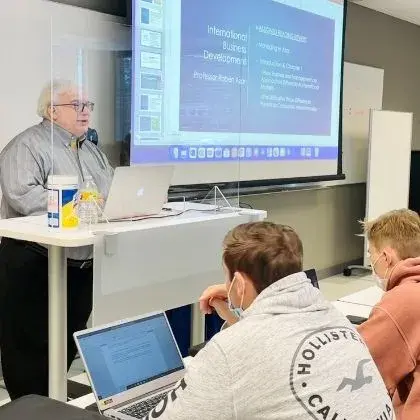News
Global Business: Robert Azar's recipe for success

A consultant to American and European companies doing business in Asia, Robert Azar is the author of several books* on management practices in Asia. Today, he teaches as a guest professor in the field of global business at the Raleigh campus.
Professor Robert Azar, as a visiting professor at SKEMA Business School, what is it about SKEMA Business School that attracts you?
SKEMA operates its own campuses on five continents. It not only allows but also requires students in both undergraduate and graduate programmes study at any of their international campuses.
In addition, it requires instruction at all its campuses to be in today’s international language of business (English). These make SKEMA one of the most internationally oriented business schools I know of. It also requires both faculty and students to excel in a truly multinational and multicultural environment. For students, this is essential to succeed in today’s business world.
Why management methods diverge between Asia and the west?
The time horizons with which management operates companies is different—short term in the west but long term in Asia. The US is the most extreme in utilising a short-term outlook, as performance is typically measured in months for the short term, in quarters for the mid-term, and a few years for the long term.
Asia is at the opposite end of the time horizon spectrum; companies calculate short term as one to three years, mid-term is four or five years, and long term is five to ten years. Europe is in between these two extremes. The result is that executives plan, invest and operate business on two entirely different time tables. Each has expectations, performance measures, and business development strategies that are different and typically conflict with each other.
Another way in which management practices diverge is what drives business in the two regions. In the west, business is transaction driven. Two companies work together to achieve a mutually agreed upon business objective or purpose. The transaction is the focus of business collaboration. Once the project ends, the firms say goodbye and go their separate ways.
It is quite different in Asia where business is relationship driven. Relationship is the foundation upon which business collaboration takes place. So while developing, investing in, and actively managing a business relationship is necessary in Asia, it is not in the west. The result is that companies in the west are able to focus only on their own corporate interests when collaborating with other firms while in Asia they are obligated to also take into consideration the interests of their partner companies.
This is a significant difference that adds a whole new dimension to working in Asia, entirely different dynamics in the companies' relationships, and expectations not found in the West. For instance, I have seen on numerous occasions how companies are willing to accept a lower return on investment (ROI) from a project in order to accommodate the interests of a business partner and promote their mutual relationship. This fundamental difference is outside the norms of western management and very often difficult for western companies to recognise and accommodate.
A third fundamental difference in management practices is the goals of companies. In the west, companies' primary goal is short-term profit and shareholder value, whereas in Asia it is market share and stable, long-term value creation. A fascinating difference is that Asian management will pursue these long-term goals even if that entails red ink in the short and mid-term. This is radically different from the US where executives are quick to "cut their losses" and exit a business if profit goals are not met in a short time. From the perspective of Asian management, this makes working with western companies much more unstable and riskier as a result.
What are the soft skills and the hard skills to know to be able to work in Asia? And, for Asian people, what are the soft skills and the hard skills to know to be able to work in western countries?
I have taught students from five continents and I always tell them that being a functional expert in their chosen field of business (such as marketing or finance) is not enough to succeed in today’s complex and constantly changing global business environment. For example, in addition to their business specialisation, students also need to master foreign languages—the more the better.
Working in multinational and multicultural teams is also essential. Another critically important skill is developing strong oral presentation skills. Being an effective presenter is a must.
Why? Because communication is the very lifeline of international business.
“Intercultural management”; that is being able to understand and factor in the profound impact that cultural differences have on how business is planned, invested in and operated in each unique market around the world. Working in multinational and multicultural teams is also essential. Another critically important skill is developing strong oral presentation skills. Being an effective presenter is a must. Why? Because communication is the very lifeline of international business.
Is it easy today for a western student to find work in Asia in business, and vice versa?
Yes, if they go about it in a smart way. Companies rely too much on key word searches and algorithms these days when interviewing. And so I always mentor my students to also take different approaches in their job search. How can they do this?
For students interested in working in countries other than their homeland, seek employment with companies from your home country operating in those countries you are interested in working in. For example, a French student wishing to work in the US should list up and approach French companies in the US.
There are thousands of them! There are nearly 5,000 French companies in the US and they employ close to 700,000 people last time I checked.
Another way students can differentiate themselves from other job seekers is to find ways to develop contacts at companies of interest. One common way to do that is through SKEMA’s far-reaching global alumni network. Several of my students have found jobs by connecting with alumni. However, there are other ways.
For example, professional networking programmes are constantly occurring for companies, for industries (industry association programmes), for business organisations (such as chambers of commerce), and the commerce or economic development department of all 50 states in the US. I always encourage students to get involved in these programmes while they are in school to create their own network of contacts in companies and industries of interest.
Robert Azar is author of :
- Managing in Asia: Mastering Asia’s Divergent Management Practices.
- Navigating Japan's Business Culture: A Practical Guide to Succeeding in the Japanese Market
- Negotiating in Asia: A Practical Guide to Succeeding in International Negotiations.


